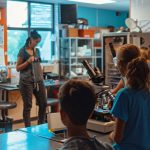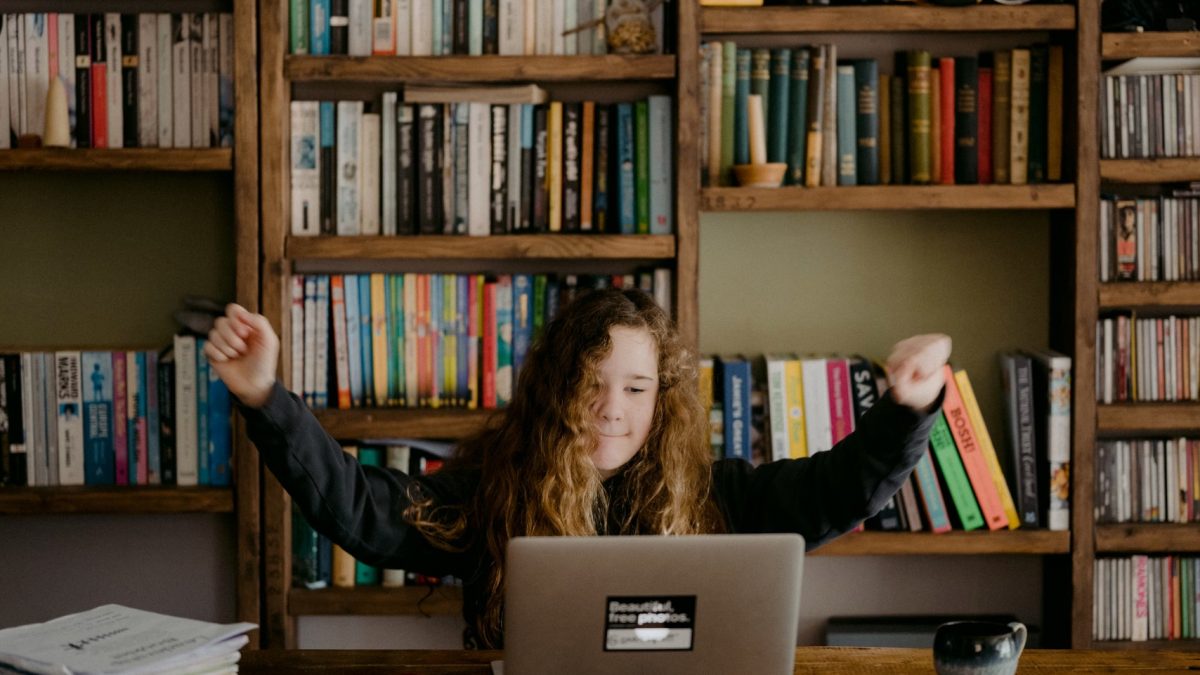
Unlock Potential With Top Tutors in Hong Kong
19 7 月, 2024
Learn Biology in an Interactive Class Environment
20 7 月, 2024Teacher education programs are ripe for a transformation, one that equips educators with the skills necessary to thrive in a rapidly changing academic environment. Integrating tools like JavaScript into instructional methods not only breathes new life into the curriculum but also ensures that teachers are well-versed in the digital resources that resonate with students. On the other hand, the commitment seen in volunteering forms a benchmark for the kind of proactive engagement beneficial in these programs. With the UK's focus on subjects like physics and maths, tutors need access to ongoing research and innovations to stay ahead. Keep reading to learn how these strategies can redefine teacher preparation and lead to more effective teaching outcomes.
Incorporating Technology Into Teacher Education
Effective integration of technology into teacher education shapes mentors equipped to navigate modern classrooms. A critical goal in the evolution of teaching methodology is ensuring that educators are adept in employing EdTech tools for interactive learning, which sparks engagement and deepens understanding for students. At the same time, enhancing online collaboration platforms enables peer-to-peer mentorship and the exchange of ideas, mirroring the collaborative environments students will encounter. Equally pivotal is the development of digital literacy among educators, creating a foundation for information literacy that both teachers and students can build upon in an interconnected, tech-driven educational landscape.
Introducing EdTech Tools for Interactive Learning
A UNESCO study on technology's impact in teacher training programs revealed that students pursuing a Bachelor of Education, especially within the science discipline, benefit significantly from hands-on experience with EdTech tools. Immersive experiences facilitated by technology empower teacher candidates to foster interactive environments that mirror real-world science applications, a tactic seen increasingly in programs across England.
In response, a leading professor at a prominent English university championed the proactive inclusion of digital resources in teacher education. By showcasing through active demonstrations, future educators understand how to seamlessly integrate various technologies into lesson plans, thus preparing them to cultivate a dynamic learning atmosphere in their future classrooms.
Enhancing Online Collaboration Platforms for Peer Learning
Universities in Australia are pushing the boundaries by fostering the use of online collaboration platforms within their Bachelor of Science and certificate in education programs. These platforms serve as virtual roundtables where aspiring teachers can share information, critique instructional strategies and grow together as a community of educators.
Integrating these digital spaces into teacher training, prospective teachers pursuing a Bachelor of Science or certificate in education can apply theoretical knowledge to practical scenarios, receiving real-time feedback from peers and mentors. This immediate exchange of information and experience cultivates an enriched learning environment that is crucial for ambitious teachers in training.
Developing Digital Literacy Among Educators
Language skills are inseparable from the suite of competencies required for educators today, particularly for those in linguistically diverse regions such as the Yau Tsim Mong District. With professional development programs, teachers, including yoga instructors, gain digital tools enabling them to reach and engage students across language barriers effectively.
In Kowloon's bustling education centers, a solid grasp of digital literacy affords teachers an edge in delivering their curricula. Continuous professional development sessions, brimming with technological insights, are critical to ensuring that educators, regardless of their specialty, remain fluent in the evolving language of digital education.
Implementing Reflective Teaching Practices
With the evolving demands of 21st-century education, colleges recognize the need to weave reflective teaching practices into their teacher training modules. A key tactic involves organizing structured reflective sessions that promote continuous improvement, far beyond traditional textbook learning. By incorporating these sessions, educators, including SEN teachers with specialized knowledge requirements, can critically assess their teaching methods and make data-driven changes to enhance their effectiveness. Additionally, the development of comprehensive portfolios plays an integral role in the individual's professional journey, allowing for tracking of personal growth and showcasing a compendium of achievements necessary for licensure. Lastly, the act of engaging in constructive peer feedback serves as a catalyst for growth, building a strong community of practitioners versed in the nuances of pedagogy and linguistics alike.
Structuring Reflective Sessions for Continuous Improvement
In teacher education, the nuanced art of reflective practice is given structure through sessions designed to enhance critical self-evaluation among educators. For instance, a Chinese language instructor in the United States, upon reflecting on a series of lessons, gains fresh perspectives on cultural integration tactics, which may influence future employment opportunities in diverse educational settings.
Programs in regions such as Wong Chuk Hang place an emphasis on reflective sessions that assess instructional successes and areas for growth, which can have implications as significant as ensuring instructors maintain health insurance through sustained employment. By actively engaging in reflection, educators fine-tune their approaches to meet evolving learning needs, thus securing their place within the profession.
Utilizing Portfolios for Personal and Professional Development
In Thailand, the integration of portfolios as a staple of teacher education programs aligns with policies advocating for lifelong learning. Teachers collect evidence of their instructional strategies and student outcomes, which not only prepares them for the International Baccalaureate educator network but also encourages ongoing personal growth.
Across Canada, policy changes have shifted the nature of teacher appraisals to emphasize continuous improvement through portfolio use. The curated content within these portfolios chronicles an educator's journey and becomes a powerful testament to their dedication to lifelong learning and professional enrichment.
Encouraging Peer Feedback to Foster Growth
In early childhood education, literacy development is fundamental, and peer feedback serves as an observational tool that enriches this process. Museums, with their interactive exhibits and resources, often partner with teacher programs to provide a unique backdrop for peer observations, fostering a supportive environment where educators can critique and refine literacy teaching strategies.
When preparing for exams, teachers benefit from feedback on their instructional methods. The opportunity to engage in meaningful discourse about observed teaching moments allows educators to identify areas for improvement, ensuring a more holistic approach to literacy and early childhood education program development.
Fostering Collaborative Learning Environments
The drive to intertwine collaborative efforts within teacher education programs is gaining traction as a key component in refining pedagogical skills. As a nod to the dynamic art of teaching, educators, notably English teachers with a Bachelor of Arts, are increasingly encouraged to participate in team teaching strategies, illustrating the profound benefits of shared expertise in London's diverse classrooms. These collaborative approaches extend to organizing interdisciplinary projects, where educators coalesce around common themes to construct robust, cross-curricular experiences in tune with the needs of the 21st-century learner. Additionally, facilitation of professional learning communities provides a framework akin to a living dictionary; it’s a space where teachers continually add to their collective knowledge, refining practices that influence the trajectory of their careers and, by extension, the educational outcomes of their students.
Promoting Team Teaching Strategies
Team teaching strategies often integrate the principles of psychology to tap into diverse learning styles, creating a more dynamic educational experience. In the district of Yuen Long, educators with an associate degree actively seek collaborative opportunities to enhance classroom dynamics, adhering to a job description that prizes adaptability and collective skill development.
The effectiveness of team teaching lies partly in the blend of different skill sets, enabling educators to approach topics from multiple angles. Those holding an associate degree in education frequently partner with experienced teachers to design lesson plans that combine their unique strengths, ultimately benefiting students within varied learning environments.
Organizing Interdisciplinary Projects Among Teachers
In China, teacher assistants who have achieved a RYT 200 certification are being drawn into interdisciplinary projects to provide insights on mindfulness and holistic education. Their collaboration especially enriches programs where stress management and self-awareness are integral to the curriculum, reinforcing the role of wellbeing in comprehensive education.
Meanwhile, the incorporation of foreign language skills, such as proficiency in the Spanish language, is proving invaluable in interdisciplinary projects. Teachers and teacher assistants bring a diverse array of cultural perspectives to the table, facilitating a broader understanding among students and fostering a more inclusive approach to learning in a global context.
Facilitating Professional Learning Communities
Education bureaus endorse the creation of professional learning communities as a conduit for innovation in teaching practices. By encouraging humour and open communication in these collectives, educators, including those seeking their bachelor of teaching in Kwun Tong, can share insights that lead to novel instructional methods.
These communities, supported by the local education bureau, continually inspire teachers to challenge preconceived notions and embrace new perspectives. Active participation within these groups allows graduates from bachelor of teaching programs to integrate innovation and collaborative solutions into the classroom, fostering a progressive approach to education.
Strengthening Field-Based Learning Experiences
The aspirations of a lecturer extend well beyond the confines of the university; they aim to see their math teacher trainees apply historical knowledge and contemporary pedagogies in a practical learning environment. Optimization of teacher education programs now leans heavily on field-based experiences, bridging the gap between theory and daily classroom realities. Internships grant trainee teachers the vital opportunity to connect theoretical frameworks to hands-on practice, while tailored mentorship programs pair them with seasoned educators for guidance and support. Moreover, robust partnerships with schools allow emerging teachers to hone their skills within a real-world context, an approach that aligns with progressive education policy, fostering well-rounded learning environments for both the educators in training and their future students.
Connecting Theory to Practice Through Internships
Internship programs offer grammar experts a chance to blend theoretical acumen with the hands-on challenges of vocational education settings. This integration is instrumental in equipping teacher candidates with the confidence to achieve qualified teacher class status, as they navigate the complexities of actual classroom management.
Teacher trainees receive personalized feedback during internships, which is paramount in refining their instructional approaches and classroom management strategies. Such real-world assessment and guidance pave the way for a seamless transition into becoming competent, qualified educators within the vocational education spectrum.
Bridging Student Teachers With Mentorship Programs
Mentorship programs within teacher education, especially in the Philippines, are evolving to include a broad spectrum of disciplines, such as visual arts and economics, creating a well-rounded support system for student teachers. Partnering with seasoned professionals in these areas enhances the trainees' instructional capabilities in the humanities, making the learning process more comprehensive.
In institutions where library resources are pivotal, mentorship includes guiding student teachers on how to integrate these repositories into lesson planning. This fosters a richer educational framework for subjects such as visual arts, where accessing diverse materials can profoundly impact teaching practices and student engagement.
Enhancing Partnership With Schools for Real-World Experience
Aligning teaching strategies with practical applications is at the forefront of partnerships between education programs and high schools. Through such collaboration, pupils working toward their high school diploma benefit from the innovative approaches fostered by teacher trainees directly in the classroom.
A head teacher’s guidance is instrumental in shaping trainee teachers’ understanding of the educational landscape. Collaboration with experienced educators allows trainees to create compelling cover letters that reflect a blend of academic knowledge and real-world teaching insights.
Advancing Pedagogical Skills and Knowledge
Teacher education programs are on the cusp of transformation, driven by a commitment to strengthening the foundation of pedagogical skills. In Scotland, teaching assistants and ESL teachers are finding new vigor through Continuous Professional Development Workshops, designed to align their instructional techniques with the changing tides of education. Postgraduate Certificate in Education holders are increasingly recognizing the value of certifications in innovative teaching methods. These certifications not only reinforce current practices but also introduce educators to pioneering strategies that resonate with a diverse student body. Additionally, specialised training in inclusive education is becoming integral, granting teachers the acuity needed to cultivate learning environments where every student, irrespective of their cultural background or learning needs, can thrive. Collectively, these focused initiatives are charting a course towards a more dynamic and inclusive educational culture.
Continuous Professional Development Workshops
Continuous Professional Development Workshops offer a dynamic approach for language education specialists to refine their teaching methodologies. These workshops provide an arena for those with a postgraduate diploma to evaluate and improve their instructional techniques.
Aspiring substitute teachers, particularly those who aim to become a net teacher, gain from workshops that focus on the responsible management of personal data. Such tailored training equips educators with the necessary skills to handle sensitive information ethically and effectively in an educational setting.
Certifications in Innovative Teaching Methods
Educator certification programs specializing in cutting-edge teaching methods often focus on nurturing creativity within the classroom. By equipping educators with training centered around innovative techniques, such courses can translate into tangible salary advancements and heightened job satisfaction.
The pursuit of certifications not only expands an educator's knowledge bank but also supports a healthier professional ecosystem. Teachers who engage in continuous learning often bring a revitalized approach to their interactions with students, thereby fostering a more dynamic and wholesome learning environment.
Specialized Training in Inclusive Education
Specialized training in inclusive education is equipping teachers with approaches tailor-made to diverse classrooms. Incorporating Cantonese linguistic elements into a lesson plan, for example, acknowledges and values cultural diversity, ultimately enhancing the pedagogy to address varied learner needs.
Distance education specialists are now creating comprehensive PDF resources to guide educators in developing inclusive curricula. These materials deploy best practices that affirm students' identities and backgrounds, leading to environments where every learner's potential is recognized and nurtured.
Evaluating and Updating Curriculum Content Regularly
As teacher education programs strive to remain relevant, ongoing curriculum evaluation and updates emerge as a cornerstone of their success. Syncing course material with current educational standards ensures that emerging teachers grasp the core disciplines' expectations, shaping them into leading educators adept in cultivating both academic prowess and social skills. Embracing multicultural education is another forward step, inviting a community of learners to appreciate and engage with diversity. Moreover, the process becomes holistic when it incorporates insights from educational stakeholders, which translates to real-world feedback to refine teaching approaches. This kind of leadership in curriculum design not only reinforces the value of continual learning but also upholds the aim to produce well-rounded, socially-skilled educators ready to inspire the next generation.
Aligning Curriculum With Current Educational Standards
To stay abreast of evolving educational demands, a progressive mindset is vital for those responsible for upgrading teacher education curricula. By assimilating feedback from educational supervisors and incorporating the latest mastery benchmarks, programs ensure graduates, including those with a Master of Arts in Teaching, are well-prepared for the realities of contemporary classrooms.
Tutor education programs benefit from leveraging the vast resources accessible via a web browser, regularly infusing new chemistry content aligned with modern pedagogical standards. Educators must maintain curriculum relevancy, an approach that supervisors with hands-on classroom experience can skillfully oversee, ensuring trainees are versed in the most current educational strategies and knowledge.
Integrating Multicultural Education to Foster Diversity
As part of the evaluation process within Kowloon Tong's teacher education initiatives, the infusion of multicultural aspects into the curriculum stands out as a strategic priority. Educators, including asst teachers, are encouraged to weave a diverse menu of cultural perspectives throughout their teaching, promoting an environment where every voice is valued and every tradition explored.
A Doctor of Philosophy in Education contributes significantly to the refinement of these programs by offering in-depth analyses and recommending enhancements that lead to a richer, more diverse educational experience. This continual process of curriculum update and evaluation ensures that teacher education programs produce graduates who are well-equipped to foster diversity in the classroom.
Incorporating Feedback From Educational Stakeholders
Teacher education programs in Asia consistently improve by actively seeking and valuing the input from classroom practitioners, policy makers, and academic researchers. Their collective feedback identifies gaps between the current teaching practices and emerging classroom needs, directly impacting PGCE syllabi and instructional methods.
Similarly, the refinement of teacher education programs, such as those in England, hinges upon incorporating suggestions from a diverse array of stakeholders. This feedback loop enables curriculum designers to tailor PGCE content to better prepare educators for the dynamic and varied challenges found in modern classrooms.
Conclusion
Teacher education programs continuously adapt, ensuring educators master both technological integration and reflective practices essential for modern classrooms. Collaborative learning and field-based experiences provide practical application, enriching instructional skills and fostering adaptability among trainee teachers. Specialized workshops, certifications, and a focus on inclusive education prepare educators to meet diverse student needs, enhancing teaching effectiveness. Moreover, regular curriculum updates informed by stakeholder feedback ensure teacher education remains relevant and graduates are well-equipped for dynamic educational environments.
.png#387)



